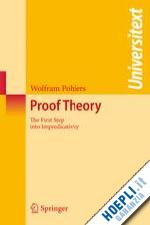

Questo prodotto usufruisce delle SPEDIZIONI GRATIS
selezionando l'opzione Corriere Veloce in fase di ordine.
Pagabile anche con Carta della cultura giovani e del merito, 18App Bonus Cultura e Carta del Docente
Wolfram Pohlers (born 1943) is Full Professor and Director of the Institute for Mathematical Logic and Foundational Resarch at the Westfälische Wilhelms-Universität in Münster, Germany. He received his scientific training at the University of Munich where he worked as an Associate Professor from 1980 to 1985. From 1989 to 1990 he was a visiting scholar at the MSRI in Berkley and in 2005 he taught at the Ohio State University in Columbus.











Il sito utilizza cookie ed altri strumenti di tracciamento che raccolgono informazioni dal dispositivo dell’utente. Oltre ai cookie tecnici ed analitici aggregati, strettamente necessari per il funzionamento di questo sito web, previo consenso dell’utente possono essere installati cookie di profilazione e marketing e cookie dei social media. Cliccando su “Accetto tutti i cookie” saranno attivate tutte le categorie di cookie. Per accettare solo deterninate categorie di cookie, cliccare invece su “Impostazioni cookie”. Chiudendo il banner o continuando a navigare saranno installati solo cookie tecnici. Per maggiori dettagli, consultare la Cookie Policy.